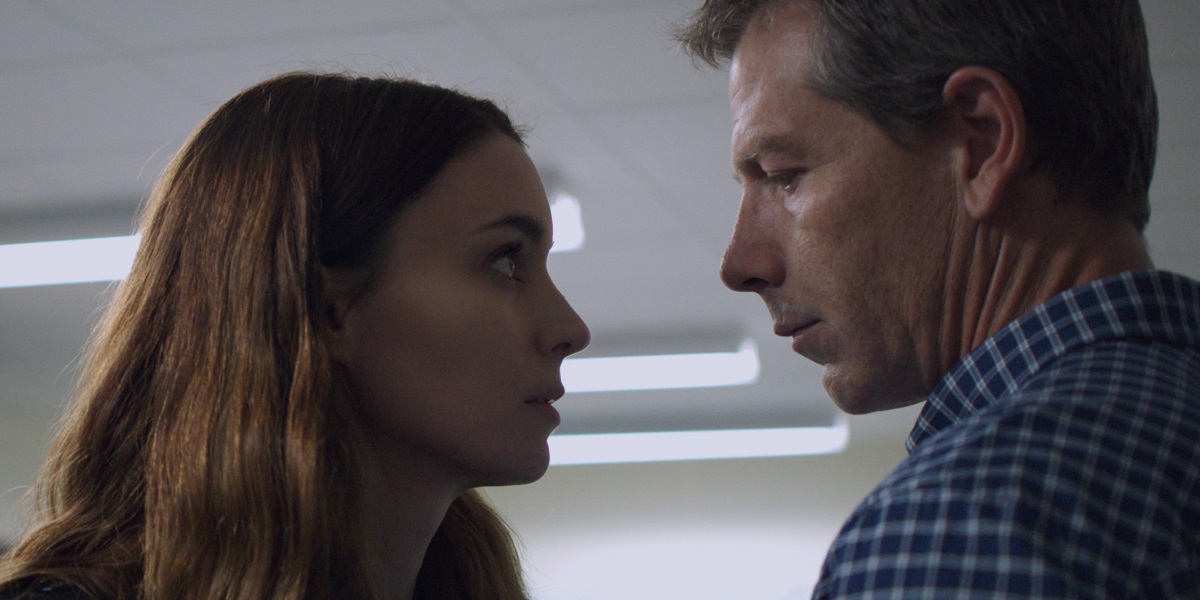Festivals are known for their share of difficult subject
matter, but “Una” provokes more
chair creaking from uncomfortable shifting than most. A movie about a young
woman (Rooney
Mara) who, 15 years later, confronts the former neighbor (Ben Mendelsohn)
who sexually assaulted her when he was 13 will do that. It’s made all the
more challenging by the fact that the movie goes where few do: it reveals the
relationship between Una (Mara) and Ray (Mendelsohn) was consensual and they
were in love.
The two actors provide tremendous—even brave—performances
here, deftly navigating the complex emotions the characters are wrestling with
internally and flinging at each other. But the hard work of the actors is undermined
too often by the rest of “Una.” That
comes partly in the handling of Ray’s over-stressing of “I’m not one of them”
(i.e. a pedophile) and his justification, which teeters a little too much in
seeming like it sympathizes with him. But mostly the sabotage comes in the way
the movie plays out.
“Una” is adapted from the play “Blackbird” by David Harrower
(who wrote the screenplay too) which, according to first-time director Benedict
Andrews, sees the two characters squaring off in a single room. Where the film
stumbles is taking the momentum generated by the actors (and required to give
their face-off its power) and continually interrupting it through incessant
flashbacks that add little to the proceeding, and a ridiculous subplot where
Ray is repeatedly hiding in his workplace—where Una has confronted him—to avoid
a boss and co-worker. It all leads to
the feeling that when “Una” ends it’s somehow not enough, despite everything
Mara and Mendelsohn gave to it.

“Una” wasn’t the only film that lets the quality of its
performance down. There’s also “Strange
Weather,” which has a tremendously rich performance from the
ever-dependable Holly
Hunter. There’s a lot for her to dig into here, as she plays the
free-spirited Darcy, haunted by the suicide of her son, Walker, seven years
ago. It’s a wound that gets reopened when she discovers both a new clue about
the day he shot himself and that, Mark, a former friend of Walker’s, has stolen
her son’s business idea and made millions. So, she sets out on a road trip with
her friend Byrd (the wonderful Carrie Coon) to
both confront Mark and talk to those who were with Walker the day he died. The
ensuing journey requires Hunter to portray grief, anger, humor, denial,
epiphany—and she does it all with a grace and humanity that makes Darcy a
wonderful character to follow.
The problem is “Strange Weather” doesn’t trust Hunter or its
audience as much as it should. The character’s internal conflicts and the
movie’s message are repeatedly spelled out in the script and said aloud by its
characters. Byrd especially is given the thankless task of telling Darcy—but
really us—things like “You’re stuck and you can’t see it” or “You think
everybody who ever did you wrong is a monster. I just hoped by now there’d be a
shade more gray in your world view.” Those lines play less like authentic tough
love from a friend, and more like the film trying to yell its theme in our ear
to make sure we’re getting it—right down to having Darcy at one point sit in
front of a sign that reads, “In the long run, the hardest thing to do is find a
way out” or having her deliver monologues to a voiceless character about her epiphanies. Of course Hunter nails the monologue, but it’s exactly
the kind of moment that you realize the injustice it’s doing her performance—by
not letting her show us what the movie insists she has to tell us.
Rob
Reiner’s “LBJ” does a little
more justice to its lead performer, Woody Harrelson.
Maybe even a little too much justice, given that the Lyndon B. Johnson here is
full of what you might call Harrelsonian moments. Take for example, a scene
where LBJ sits on a toilet with the door open and gives instructions to his aid
while he wipes his derriere. It’s a moment one of the aids responds to with a
whispered, “And he wonders why people don’t like him.”
Therein, believe it or not, lies one of the thematic hooks
of this particular adaptation of the life of the 36th President of the United
States. “LBJ” positions itself as an underdog story around a man whose
“Rosebud” is that he is afraid nobody likes him. What Reiner’s film seems to
want to do is indicate why those who disliked LBJ—notably a very bullying
version of Bobby Kennedy—were wrong.
“LBJ” never lacks in a minimum standard of entertainment
value, but it’s hard not to shake how much the director is in this man’s
corner, nudging him along in a story that at times borders on hero worship—a political
“Rudy.” Now, biopics are, of course, not obligated to present nuance in their
portrayals, but “LBJ” proves why it’s advisable to do so. If you don’t, as an
audience you begin to notice what’s being left out in an uncomplicated
portrayal of a complicated life. The more a film like this paints in the
positive spaces of history, the more you notice the negative space. In this
case, Vietnam. “I don’t want to think about Vietnam,” LBJ says near the end of
the film, and it’s basically Reiner’s defense for not doing so either. To him,
this is a movie about Civil Rights and LBJ’s role with it. That’s fine, he’s
allowed to do that. That still doesn’t change the fact that Rob Reiner’s film
becomes something like a Frank Capra version of history, which—the more the
movie goes on—gets harder and harder to overlook.

Strangely enough, Frank Capra isn’t a bad transition point
to make our way to Garth Jennings’
“Sing” which offers populist
feel-goodery, this time with singing animals.
Full of big names like Scarlett Johansson, Matthew
McConaughey, Reese Witherspoon and others, animated movie “Sing” comes from
the creators of “Despicable
Me,” which is to say it’s maybe not a movie you’d expect to be anyone’s
favorite at a serious international film festival. Now is the moment I tell you
with—with an emoticon shrug—that it was one of my favorite movies at a serious
international film festival.
“Sing” is undoubtedly a movie for kids. It’s full of silly
slapstick humor, cute little anthropomorphized animals, and a bevy of pop songs
you’re probably sick of. It embeds all this in a movie about the owner of a
failing theater who organizes an “American Idol”-style singing competition
where everyday people get a chance to realize their long-held warbling dreams.
It’s pervasive message about the importance of following
your dreams is great for the wee ones, though it may prove
indigestible for any realistic (or cynical) adult. But it’s presented in “Sing”
in such a sincere, good-hearted and well-meaning way, it becomes not entirely
something that’s useless to hear as an adult slogging their way through
responsibilities.
What’s more, “Sing” may not be a traditional musical—it’s
more jukebox musical, albeit one that doesn’t go for the full run-time (but
then again, neither does festival favorite “La La Land”). But
it nonetheless embodies in its crowd-pleasing finale a lot of the spirit of old
musicals: singing an exorcism of the emotions deep inside of you that need to
get out. Seeing that done so joyously and o lacking in cynicism here can’t help
but be infectious. The message is one worth hearing, even if it’s delivered by
singing elephants, hedgehogs and mice.












